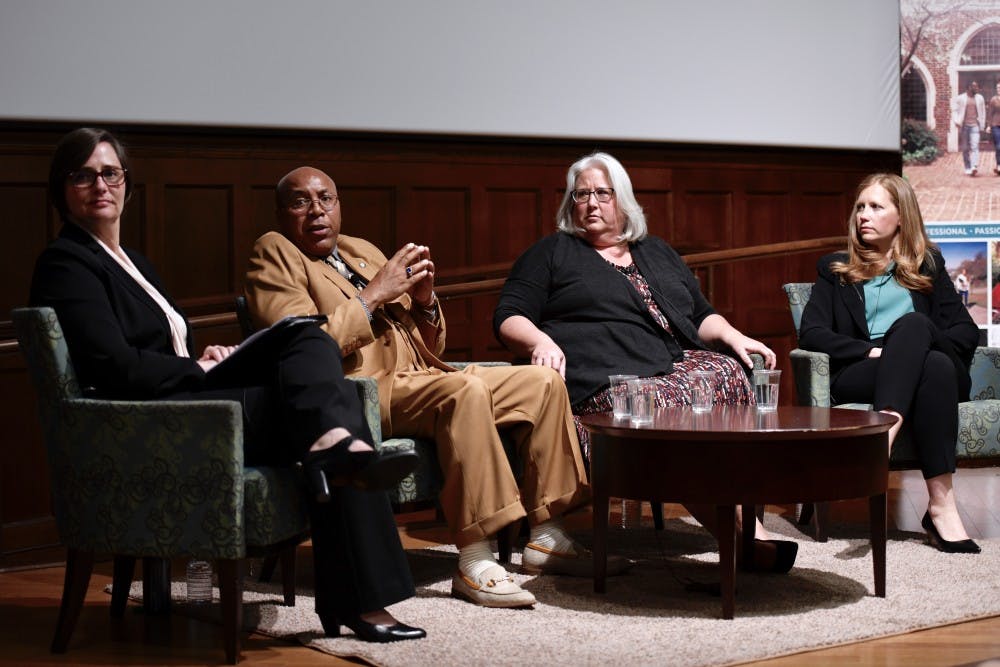Two University of Richmond professors were featured in the Netflix documentary series “The Innocence Files.”
The series follows the Innocence Project, an organization that “exonerates the wrongly convicted through DNA testing and reforms the criminal justice system to prevent future injustice,” according to its website.
Julian Hayter, associate professor of leadership studies, and Mary Tate, clinical professor of law and director of the Institute for Actual Innocence, are both featured in the series' sixth episode, “The Witness: Making Memory.”
The episode focused on the wrongful conviction of Richmonder Thomas Haynesworth, an African American who was wrongfully convicted of rape in 1984, as well as one of the rape victims who mistakenly identified Haynesworth as her attacker, Janet Burke. Haynesworth was exonerated with the help of DNA evidence after serving 27 years in prison, according to the episode.
Liz Garbus, one of the executive producers of “The Innocence Files” and the director of the sixth episode, asked Hayter to be interviewed for the series since he is an expert in African American history, Hayter said.
“My role was essentially to historize the events surrounding Thomas Haynesworth’s imprisonment, what Richmond looked like at the time and how it evolved over the course of his duration in prison," Hayter said.
In the episode, Hayter said the racial tension in the city of Richmond during 1984 had led to the wrongful conviction of Haynesworth. There was a spike in violent crimes and murders in the city between 1982 and 1984, which led to people feeling unsafe, he said in the episode.
"A lot of [the spike in crime] had to do with the segregationist policies that compressed African Americans into these impoverished communities," Hayter said in the episode. "And as work began to dry up in the late 1970s and 1980s, what were once poor but working communities were now poor, unemployed communities. This increases the paranoia of the white community.”
One of the show's producers reached out to Tate when the series decided to have an episode focused on Haynesworth after watching a YouTube video of Tate interviewing Haynesworth in 2012. In 2019, the producer and Tate worked to put together a discussion panel about wrongful convictions that featured Haynesworth, Burke and Shawn Armbrust, the lawyer who represented Haynesworth and executive director of the Mid-Atlantic Innocence Project, Tate said.
Tate moderated the panel in the Ukrop Auditorium on April 3, 2019. The episode showed emotional clips from the panel, such as Burke and Haynesworth discussing when they first met each other after he was released from prison and Haynesworth talking about how he is not bitter toward those who doubted his innocence.
“It was a terrific honor to be the moderator because I have so much respect for [Haynesworth, Burke and Armbrust],” Tate wrote in an email to The Collegian.“What is most memorable to me from the panel discussion is the humanity and strength of both [Haynesworth and Burke]. Their resilience and kindness are so powerful to witness.”
Rising junior Haley Huamani took Tate's first-year seminar Wrongful Convictions and said that she had learned how common it was for people to be wrongfully convicted during the class. However, she said hearing Haynesworth discuss it in the episode helped her better understand how horrific the situations of the wrongfully convicted can be.
Enjoy what you're reading?
Signup for our newsletter
"I just kept thinking, imagine if that was me or anyone I knew sitting in jail for 27 years," Huamani said.
Both Hayter and Tate hope that “The Innocence Files” raises people's awareness of how widespread wrongful convictions are and how unreliable eyewitness testimony can be, they both said.
“I think a documentary of this [caliber] helps to raise awareness for the American public that our criminal justice system is [wracked] with structural inequities around race and class,” Tate wrote. “It is a moral emergency that we reckon with this reality and rectify it to the fullest.”
Contact news writer Maeve McCormick at maeve.mccormick@richmond.edu.
Support independent student media
You can make a tax-deductible donation by clicking the button below, which takes you to our secure PayPal account. The page is set up to receive contributions in whatever amount you designate. We look forward to using the money we raise to further our mission of providing honest and accurate information to students, faculty, staff, alumni and others in the general public.
Donate Now



